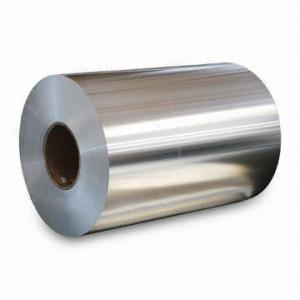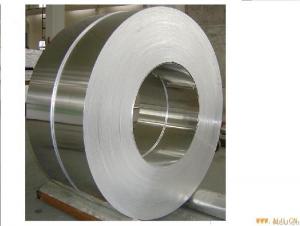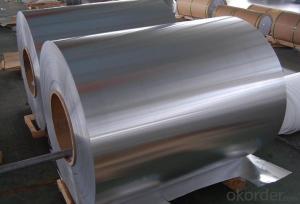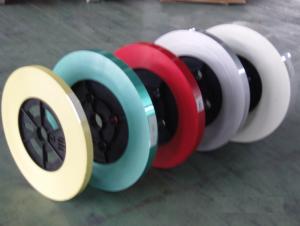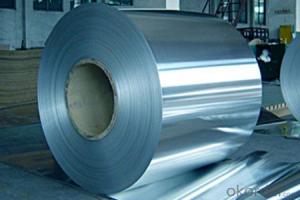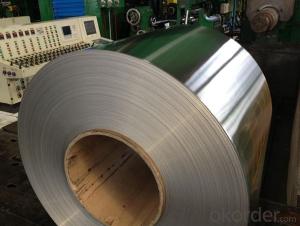HVAC Coating Series 1,3,5 Aluminum Coil Mill Finished
- Loading Port:
- Shanghai
- Payment Terms:
- TT or LC
- Min Order Qty:
- 5 m.t.
- Supply Capability:
- 9000 m.t./month
OKorder Service Pledge
OKorder Financial Service
You Might Also Like
Aluminium is a relatively soft, durable, lightweight, ductile and malleablemetal with appearance ranging from silvery to dull gray, depending on the surface roughness. It is nonmagnetic and does not easily ignite. A fresh film of aluminium serves as a good reflector (approximately 92%) of visible light and an excellent reflector (as much as 98%) of medium and far infrared radiation. The yield strength of pure aluminium is 7–11 MPa, while aluminium alloys have yield strengths ranging from 200 MPa to 600 MPa. Aluminium has about one-third the density and stiffness of steel. It is easily machined, cast, drawn and extruded.
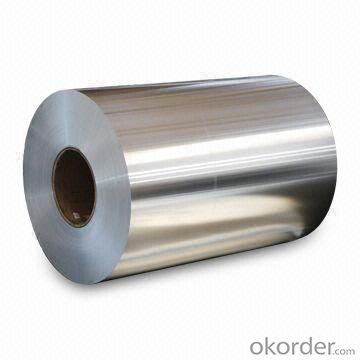
Alloy: AA1050, 1060, 1100, AA3003, 3005, 3015, 5052, 5754, 5083,8011,etc
Temper:H14/16/18/22/24/32,HO etc.
Thickness:0.2mm—100mm
Width:100mm—2300mm (Can be slitted)
Inner Diameter: 508MM
CoilWeight:500kg-3000kg(Max.)
Application: Foil stock, Circles, Roofing, Canstock, Marine plate,Anti-sliperypurpose in vehicles, packing and appliance.
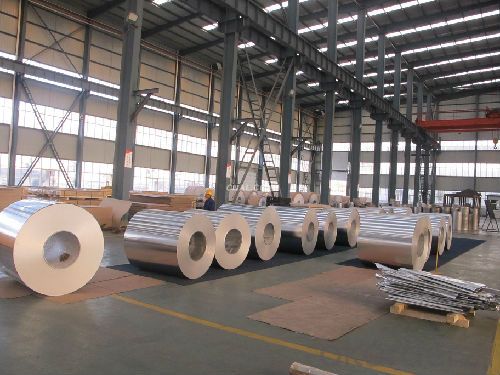
Packaging & Delivery
Packaging Details: | 1.with wooden pallet packing. |
Delivery Detail: | within 30 days |
Our Services
1.An experienced management team can guarantee the high quality.
2.An advanced and stable equipment system,we can guarantee the delivery time.
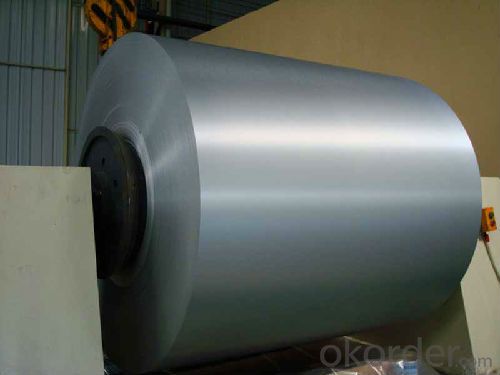
- Q: What is the maximum length of aluminum coils?
- The maximum length of aluminum coils may vary due to multiple factors, including the specific manufacturing process, capabilities of equipment, and industry standards. However, in general, aluminum coils can range in length from a few hundred feet to several thousand feet. They find common use in applications like roofing, HVAC systems, and electrical wiring. Additionally, it should be noted that transportation and handling considerations may also impose limitations on the maximum length of aluminum coils.
- Q: which metal is very common today and which one will be most common in future. steel or aluminum
- Currently, steel is very cheap but bulky and lacks variability. Aluminum is a lot more expensive, is lighter (cheaper transport), and has variability in use. For the future, however, we would start to use nanoribbon. Substantially smaller than a strand of hair and substantially stronger than steel.
- Q: What are the typical standards and specifications for packaging aluminum coils?
- <p>The standard specification for aluminum coil packaging varies depending on the industry and region, but generally includes the following: The coil is typically wrapped in a protective film to prevent damage and corrosion. It is often strapped with steel or plastic bands to secure the coil during transportation. The packaging may also include wooden pallets or crates for stability. The dimensions and weight of the packaging are tailored to the coil's size and thickness. Compliance with international standards such as ASTM, ISO, or specific industry standards is crucial. It's important to note that exact specifications can differ based on customer requirements and the end-use application of the aluminum coil.</p>
- Q: What are the pros and cons of utilizing aluminum coils in storage applications?
- <p>Aluminum coils offer several advantages for storage, including high durability, corrosion resistance, and lightweight properties which make them easy to handle. They are also recyclable and have good thermal conductivity, which can be beneficial in temperature-controlled environments. However, there are downsides such as higher initial costs compared to some other materials and potential for denting or damage if not properly handled. Additionally, while aluminum is generally non-magnetic, it can be attracted to strong magnets, which might be a consideration in certain storage scenarios.</p>
- Q: How do aluminum coils perform in cryogenic environments?
- Aluminum coils perform well in cryogenic environments due to their low thermal expansion coefficient and high thermal conductivity. These properties allow the coils to withstand extreme cold temperatures without warping or losing efficiency. Additionally, aluminum's corrosion resistance ensures the longevity and reliability of the coils in such environments.
- Q: Can aluminum coils be used in the production of aluminum composite windows?
- Indeed, it is possible to utilize aluminum coils for the creation of aluminum composite windows. The manufacturing process of aluminum composite windows frequently involves the utilization of aluminum coils. These coils are crafted from top-notch aluminum and are commonly employed as the primary material that is subsequently molded and fashioned into the desired window frames and components. Aluminum coils present numerous benefits in the production of aluminum composite windows, such as their lightweight properties, robustness, and ability to withstand corrosion. These characteristics render aluminum coils an apt selection for manufacturers seeking to fabricate aluminum composite windows that are both of superior quality and possess extended durability.
- Q: What are the potential applications of recycled aluminum coils?
- Recycled aluminum coils have various potential applications across several industries. They can be used in the manufacturing of automotive parts, such as body panels, engine components, and heat exchangers. Additionally, they can be utilized in the production of building materials like roofing, gutters, and siding due to their corrosion resistance and durability. Moreover, recycled aluminum coils are suitable for packaging purposes, including beverage cans, food containers, and aerosol cans. Their versatility and sustainability make them an excellent choice for a wide range of applications.
- Q: I am looking for a deoderant that doesn't contain aluminum that actually works. I have tried Tom's natural deoderant and didn't get to use it long enough to see if it worked because it really irritated my skin and caused it to burn and peel. I have also tried the one made by Adidas and it seemed to work pretty well through the winter months, but now that it is getting warm again I'm noticing that it isn't quite doing the job anymore.
- aluminum zirconium is the chemical that makes you stop sweating, not that it works on most people. they can only put a certain percentage of it in deodorants, try the degree clinical, i just started using it and it seems to be doing okay, good luck i know what you are going through.
- Q: Are aluminum coils susceptible to warping or bending?
- Yes, aluminum coils are susceptible to warping or bending. Aluminum, although lightweight and highly corrosion-resistant, is a relatively soft metal compared to other materials like steel. This means that it is more prone to bending or warping under certain conditions. Factors such as excessive heat, heavy loads, or improper handling can cause aluminum coils to deform. It is important to handle and store aluminum coils carefully to prevent any damage or distortion. Additionally, proper installation techniques and maintenance practices can help minimize the risk of warping or bending.
- Q: What are the different alloys used in aluminum coils?
- There are several different alloys commonly used in aluminum coils, each with its own unique properties and applications. Some of the most frequently used alloys include: 1. 3003: This alloy is known for its excellent formability and corrosion resistance. It is often used in applications that require moderate strength, such as automotive parts, storage tanks, and kitchen utensils. 2. 5052: This alloy is highly versatile and offers good corrosion resistance, high fatigue strength, and excellent weldability. It is commonly used in the manufacturing of aircraft fuel tanks, marine components, and architectural applications. 3. 6061: Known for its high strength and excellent machinability, 6061 is often used in structural components, such as frames and braces. It also offers good corrosion resistance and is commonly used in the aerospace and automotive industries. 4. 8011: This alloy is primarily used in the packaging industry, especially for making aluminum foil. It offers good formability, high tensile strength, and excellent resistance to moisture and chemicals. 5. 1100: This is a commercially pure aluminum alloy, known for its high electrical conductivity and good thermal conductivity. It is commonly used in electrical wiring, heat exchangers, and lighting fixtures. These are just a few examples of the alloys used in aluminum coils, and there are many other variations available to suit specific needs and applications. The choice of alloy depends on factors such as desired strength, corrosion resistance, formability, and cost considerations.
Send your message to us
HVAC Coating Series 1,3,5 Aluminum Coil Mill Finished
- Loading Port:
- Shanghai
- Payment Terms:
- TT or LC
- Min Order Qty:
- 5 m.t.
- Supply Capability:
- 9000 m.t./month
OKorder Service Pledge
OKorder Financial Service
Similar products
Hot products
Hot Searches
Related keywords
